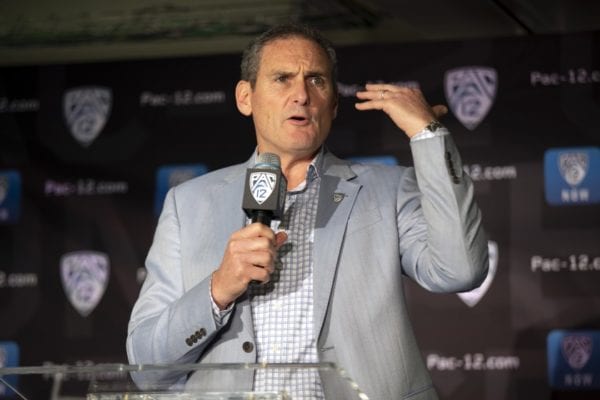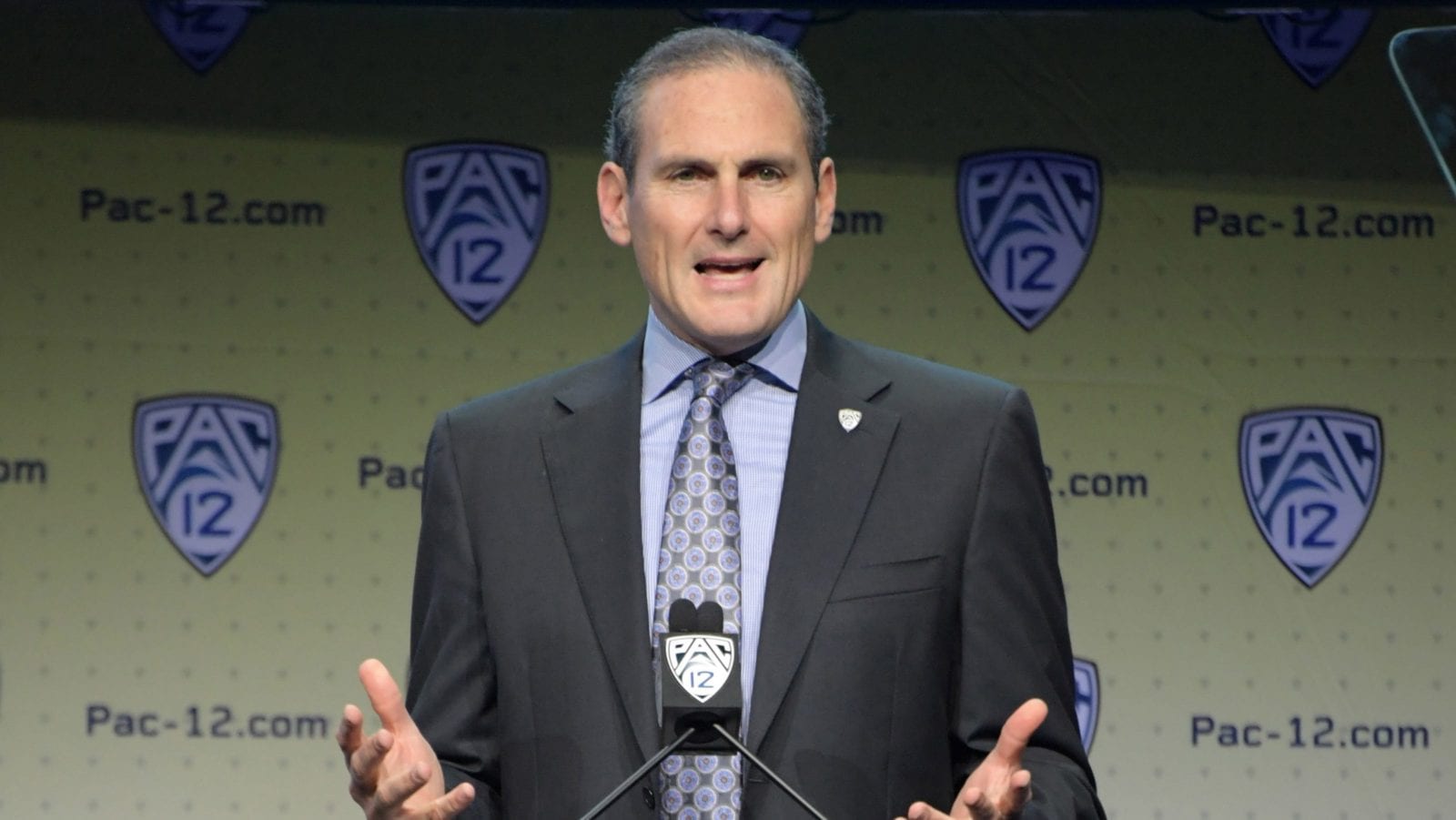Pac-12 hopes rapid coronavirus testing could bring back college football sooner
Ryan Kartje (LA Times) — When the Pac-12 voted unanimously to delay football and all other fall sports until the spring, a lack of rapid-response testing for the novel coronavirus was central to the conference’s decision.
Less than a month later, a major testing breakthrough may have quelled those concerns, leaving the door open for a potential return to Pac-12 sports sooner than initially expected.
 The Pac-12 announced Thursday that it will provide daily COVID-19 testing for athletes across the conference, after entering into a partnership with Quidel Corp., a diagnostic health care manufacturer of FDA-approved rapid tests. Those tests, according to Pac-12 Commissioner Larry Scott, would allow for results to be read within 15 minutes, enabling officials to know “every day, before every athletic practice or game that everyone participating tested negative for COVID-19.”
The Pac-12 announced Thursday that it will provide daily COVID-19 testing for athletes across the conference, after entering into a partnership with Quidel Corp., a diagnostic health care manufacturer of FDA-approved rapid tests. Those tests, according to Pac-12 Commissioner Larry Scott, would allow for results to be read within 15 minutes, enabling officials to know “every day, before every athletic practice or game that everyone participating tested negative for COVID-19.”
Such immediate access, Scott said, is “simply game-changing.”
“It’s a major step for the return of safe sports competition in the Pac-12,” he added.
But Scott also warned that a return to competition involves several other considerations, including approval from state health officials. Six Pac-12 schools, including USC and UCLA, currently don’t have approval to return to contact practice, and as such, Scott was hesitant to offer more than a faint suggestion of a timeline to return, allowing only that he’s now “hopeful” there could be a pathway for Pac-12 sports to begin before Jan. 1.
“We’ve gone about return-to-play in a very measured and thoughtful way,” Scott said. “[We’ve said] all along we’re going to let the data and the science drive us and that we’re going to have to have a high degree of confidence that by returning to play, we’re not encouraging the spread and putting student-athletes at higher risk as a result of that competition. This ability to have daily testing with immediate results is a huge step forward for us.”
Those rapid tests should be accessible by early October, Scott said, with Quidel planning to distribute its Sofia 2 testing machines to each Pac-12 member school by the end of this month. The cost of those tests remains “confidential,” but will be covered by member schools, he said.
How the conference will proceed, once its new rapid-testing protocols are in place, remains to be seen. Scott reiterated Thursday that it would take at least six weeks of ramp-up before Pac-12 schools could safely start a season, which suggests that a mid-November start — or perhaps a Thanksgiving weekend kick-off — may be the earliest possible window to open a season this fall.
But any such start would presume the cooperation of public health officials and a reduced level of community spread in both California and Oregon, where restrictions are still stringent.
“Some of this is still outside of our control,” Scott noted.
An earlier-than-expected start would also ideally include the Big Ten, with whom Scott said he has been in regular contact. The Pac-12 sees it as “a high priority” to align with the Big Ten on any new football schedule, be it this fall or in the spring.
Both conferences have been under fire since early last month, when the Pac-12 followed the Big Ten’s lead in postponing the season. As the rest of the Power Five has continued to press on with a fall start, criticism of the two conference’s respective decisions has been constant ever since, with coaches, players and parents questioning the reasoning behind it.
A dearth of access to daily, rapid testing was a particularly pressing reason for that postponement, one that Scott said he didn’t think would be solved until at least November.
With such testing protocols now within reach much faster than expected, Scott and two members of the Pac-12 medical advisory board still defended the conference’s initial decision to postpone.
“The opportunity to be able to test daily helps mitigate several of the concerns we had prior,” said Dr. Doug Aukerman, the senior associate athletic director of sports medicine at Oregon State. “But at that point in time, we didn’t have the ability to do point-of-care, daily testing and didn’t see that on the horizon. This is clearly a new development.”
Added Dr. Kim Harmon of Washington, “I really think the Pac-12 went about this the right way, keeping science in mind.”
Several concerns remain. Harmon explained that the Pac-12 still doesn’t have a grip on whether athletes recovering from COVID-19 are at an elevated risk of heart inflammation known as myocarditis. Penn State’s director of sports medicine drew some heat Thursday for suggesting that one-third of Big Ten athletes who recovered from the virus showed some form of myocarditis — an assertion he later recanted in a statement.
An answer to those questions could be on the horizon. The Pac-12 has partnered with Harvard on a research study to collect all available data on cardiac impact of the virus. Preliminary results should be available “within a month or two,” Harmon said.
“It is a dynamic situation, a step at a time,” Scott said. “But based on what we knew in mid-August, I think everyone is confident in the decision we made.”
__________
TrojanDailyBlog members — Always feel free to add information or topics to the TDB which don’t necessarily pertain to any particular moderator post or member comment.

Kobe Johnson, a 6-5, 170-pound 3-star shooting guard from Nicolet (WI), has committed to USC, he announced Thursday via Twitter (zagsblog.com). “Trojan nation here I come.” Ranked by 247Sports as the No. 49 shooting guard in the Class of 2021, Johnson chose USC over CSU, CAL, California, ELON, DePaul and KSU. Johnson is the younger brother of current DUKE frosh forward Jalen Johnson. He joins 4-star shooting guards Reese Dixon-Waters and Malik Thomas, as well as three-star big Harrison Hornery in USC’s 2021 class. “They plan to use me as a combo guard,” said Johnson. “They want me to do everything on the court.” USC now has the… Read more »
Great news. November season is a real possibility. I hope USC and others in Cali and Oregon threaten to take their practices and games to another state if those states wont give a waiver to the teams. For Helton this could be a godsend, as his top players, Amon Ra, AVT, Hufunga, Tyler Vaughns, Tufele – might play in the earlier season. I think all of them want to get some more play on tape before going to the draft. Of course, if Helton plays with those players and loses more than 1 in a shortened 8 game season, he… Read more »
I don’t see how USC could add ND to its schedule. Since when has the Pac-12 done USC ANY favors. Never. Just being realistic.
s
So let’s stumble off as an independent and leave the hippie schools behind!
i can dream, cant I? i dont really think we will play ND, but if I were in charge of the athletic department, I would really be pushing to play the big-money games to make up for lost revenues.
if the game were at the end of the season, they might even be able to have fans in the stadium!
If you think about it, it may be impossible. They could be done before the Pac ever gets started, if they ever do. I think the virus will disappear after the election and we can have football then.
So how is it Rams, Chargers, 49ers and Seahawks are all prepping to start next week and California colleges can’t have contact?
I am pretty sure that an athlete recovering from COVID he picked up at a party is at the same risk of myocarditis as the same athlete who picks up COVID at a football practice or game. The athlete is just less likely to pick it up in the latter context due to stronger controls there.
Is myocarditis something that is exclusive to athletes? Or are they the only ones that get checked for it. I read it is common to have it prior to the virus ever starting.
I have a son who is a Navy corpsman and working at Walter Reed Hospital. He mentioned there are basically two COVID-19 vaccines in the works (one from the US and the other from England) that is being literally shoved through the screening-testing process and cutting corners of normal slow processing by the FDA (due to political strong arming) with the possibility in February-March it will be ready for inoculations where the Military would be first in line to receive. If that happened and the vaccine works, then the public could expect availability sometime mid next year. Of course this… Read more »
These vaccines have already cleared their earliest trials without any rushing of them — and those early trials are where a vaccine is deemed safe before it is given to large numbers of people in later trials. If there is rushing, it will be in the time given to last-phase trials and maybe a lowering of standards for deeming efficacy of the vaccines. I personally will take a vaccine that cleared early trials, on the belief that it has a very low chance of doing harm and at least a 50 percent chance of protecting me. Anyone who doesn’t want… Read more »
The scariest thing about the vaccine is the government administering it in any way. Politics with make that a nightmare like everything else.
There are actually 2 vaccines in Stage 3 testing in the USA, there is one in Great Britian, and one in Canada. The testing itself is not be rushed and no testing rules have been broken, what is being rushed is that the vaccines (that are in final stage testing) are currently going to start mass production sometime in September so that they can have 100 million doses ready to go once they receive they receive final approval. In the past, the drug companies would not start mass production of the vaccine until the final FDA approval, so that is… Read more »
Vaccines could have been sped along even faster if they would do human challenge tests. That is where they give the vaccine and then intentionally infect the person to see if they are immune. You could easily get volunteers for this. They could literally start out with 30 people and then if it tested well with a small number, they could scale up. And the chance of a death among 30 young healthy volunteers is very small. Compare that to the tens or hundreds of thousands that will die. This is the type of backwards ethical “dilemmas” that we need… Read more »
Imagine if you will 28 out of the 30 having side effects or death. There is the delemma, backwards or not.
Sorry to revisit such an old thread, but what you are not factoring in Steveg is that the challenge trials being suggested would occur at a late stage of vaccine development when the earlier stages have already proven safety. Safety is almost always proven the hard way — you have to give the vaccine to people and see if they have side effects. Efficacy, on the other hand, comes later and requires exposure to the threat the vaccine is meant to address to confirm efficacy (whether that is community exposure or challenge exposure). I am not sure if I agree… Read more »